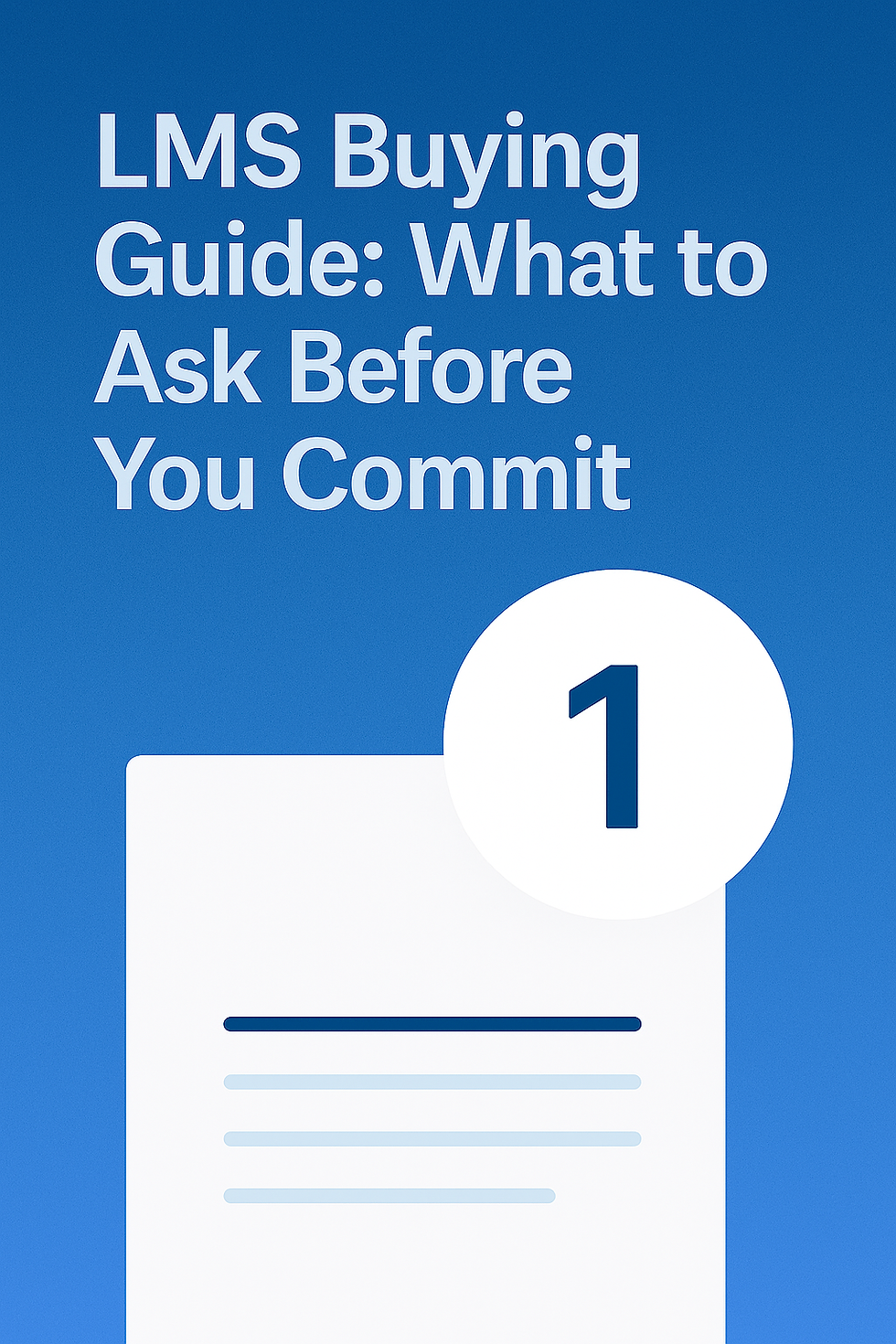LMS Buying Guide: What to Ask Before You Commit
- Alisa Herman
- May 30, 2025
- 3 min read

You’re ready to invest in a Learning Management System (LMS)—great move. But with dozens of platforms out there, choosing the right one can feel like buying a house without stepping inside.
It’s not just about features or pricing. It’s about asking the right questions to make sure your LMS fits your business, your learners, and your long-term goals.
So before you sign that contract or start that free trial, here’s your LMS buyer’s checklist: the essential questions you need to ask.
🧭 1. What Are Our Training Goals?
Start here. Don’t jump into software demos without a clear purpose.
Ask yourself:
Are we focused on onboarding, compliance, upskilling, or all of the above?
Do we need self-paced, instructor-led, or blended learning?
Will training be internal only, or include partners/customers?
Your goals shape what features actually matter—so get clear first.
📊 2. Can It Track and Report What We Care About?
Your LMS should tell you:
Who completed training (and who didn’t)
Quiz and assessment results
Time spent per course or module
Department or location-specific progress
Ask vendors:
What reports come standard?
Can I create custom dashboards?
Can managers see just their team’s data?
If the platform can’t prove ROI, it’s not worth the investment.
📦 3. How Easy Is It to Set Up and Manage?
A great LMS doesn’t require IT support every time you need to add a course.
Ask:
How long does implementation take?
What’s the learning curve for admins and users?
Is there a drag-and-drop course builder?
Can I import SCORM, videos, PDFs, or quizzes easily?
SkyPrep, for example, is built for simplicity. You can launch training in days—not months.
📲 4. Does It Support Mobile and Remote Learning?
In 2025, mobile access isn’t optional. Neither is flexibility.
Ask:
Is the platform mobile responsive?
Can learners complete training from phones or tablets?
Is there offline access?
Can remote or hybrid teams access training anytime?
Learning should fit into how—and where—your people work.
🧠 5. Can It Personalize the Learning Experience?
Training that’s too generic gets ignored. Your LMS should allow:
Role-based learning paths
Skill-level progression
Optional vs. required courses
Individual recommendations
Ask if you can tailor learning by team, region, or job title. The more relevant the training, the better the results.
🔐 6. What About Compliance and Certification?
If you’re in a regulated industry, this is a big one.
Ask:
Can the LMS track certifications and recertifications?
Can we set expiry dates and auto-reminders?
Does it generate audit-ready reports?
Is the platform SOC 2 or ISO certified?
Compliance failures are costly—your LMS should help you avoid them, not add to the risk.
🔌 7. Does It Integrate With Our Existing Tools?
You want an LMS that plays well with others.
Ask:
Can we connect it with our HR system (e.g. BambooHR, ADP)?
Does it integrate with Slack, Microsoft Teams, or Zoom?
Can we automate user sync and enrollment?
Is single sign-on (SSO) supported?
Integrations reduce friction and make your workflow smoother.
🛠️ 8. What Kind of Support Do We Get?
Training platforms should come with training—especially for your admins.
Ask:
Do we get a dedicated onboarding manager?
Is support included, or an extra charge?
Is there live chat, phone, or email support?
What’s the average response time?
SkyPrep, for example, is known for its responsive support team and customer success tools.
💰 9. What’s Included in the Pricing?
LMS pricing models vary—a lot. Don’t get caught by surprise.
Ask:
Is pricing per user, per course, or flat rate?
Are there hidden fees (storage, integrations, support)?
Are updates and new features included?
Can we scale up or down without penalties?
Get everything in writing, and make sure it matches your user volume and growth plans.
🔄 10. Can We Try It Before We Buy?
You wouldn’t buy a car without test-driving it. Don’t choose an LMS without doing the same.
Ask for:
A free trial or sandbox account
Access to admin and learner views
A demo session customized to your needs
Real case studies from similar businesses
Make sure the LMS feels intuitive for your team—not just impressive on paper.
✅ Final Thoughts
Buying an LMS is a big decision—but it doesn’t have to be a risky one.
Ask the right questions. Focus on usability, scalability, and long-term fit. And choose a platform that’s as committed to learning outcomes as you are.
SkyPrep checks every box on this list. With powerful automation, easy content creation, mobile access, and world-class support, it’s one of the best choices for businesses that want a smooth, smart, and scalable training system.
Because training should help you grow—not slow you down.






Comments